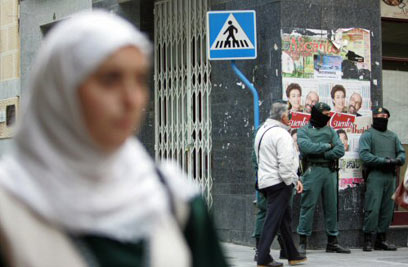
Hizbullah cancels Jerusalem Day celebrations
Organization shows signs of distress, deciding to settle for 'divine victory' rally. Also in Arab world: Struggle over veils in Britain heats up; in Tunisia, young women wearing traditional clothing beaten. Weekly column
One of the signs can be seen in the fact that Hizbullah decided to cancel the central rally for Jerusalem Day – the last Friday of the month of Ramadan, in which supporters of the Shiite militia commemorate Jerusalem every year through military demonstrations and belligerent statements.
This year Hizbullah officials announced that the central event has been cancelled and that local rallies will be held in the different regions. The organization's statement said that this is a historical year, in which the "robber of Jerusalem" (i.e. Israel) suffered a crushing and historical defeat by the group's fighters, and that the organization has decided to settle for the mass victory rally held on September 22.
"In order to ease on our honorable public, we decided to replace the central event with local activities," the statement said.
It appears that Hizbullah is trying hard to find ways to "ease on the public" as time passes since the war. The school year has just begun, and in Beirut's Dahiya neighborhood students arrived at the ruins which were once their schools.
In the Bekaa Valley, a large number of students flocked to the classrooms which have already began operating, and fears rise over the winter which is on its way, especially among those who have been left homeless.
Therefore, it is not surprising that in Hizbullah's stronghold of Baalbek, demonstrators have already taken to the streets, claiming that they are on the verge of hunger.
"The failure to deliver governmental compensation for the demolished houses is pushing us to a state of hunger," owners of the ruined houses chanted during a demonstration Friday. Although the protest was directed at Lebanese Prime Minister Fouad Siniora, it appears that if the situation is not improved, Hizbullah will also hear about it.
Tunisia: War over hijab
Tensions are heating up in Tunisia after the state banned women from wearing the hijab head covering. It appears that what until now only took place in France and other European areas is making its way into Tunisia, and during the holy month of Ramadan of all times.
It all began when Tunisian President Zine al-Abidine Ben Ali declared this week that "we must fight ethnic clothing" – the common name given to the headscarf in official media.
During a meeting with the state's Minister of Religious Affairs Boubaker El Akhzouri, the president stated that "we must separate between the foreign ethnic clothing and the original Tunisian clothing, which is the focus of identity, in order to avoid any resentment."
To his opposers he said: "Tunisia has always stuck to its loyal Islamism and stressed the value of modesty, which is views as part of its clothing tradition in cities and villages."
Ben Ali's remarks were made in support of the stance of his party's secretary-general, al-Hadi Mahni, who expressed his complete rejection of what he referred to as "the ethnic clothing which has nothing to do with the country's identity and which impairs the accomplishments and gains achieved by the Tunisian woman."

Battles over headscarf (Archive photo: Reuters)
In Tunisia, which has proudly maintained its secular identity over the years, clashes and arguments immediately broke out over the ban. Clashes took place in the north of the capital between security forces and Islamic activists. The clashes in a northern suburb of the city, near a mosque, were so severe that security forces in the area were reinforced.
Women wearing headscarfs began complaining that the security forces were trying to force them to sign a commitment to remove the hijab while entering police stations.
In another incident, legal source in Tunisia noted that security forces detained four young women wearing headscarfs and beat them. A human rights activist in Tunisia said that security officers wearing civil clothing attacked the young women and threatened to beat them if they would not remove the scarf. This incident, which was the first of its kind since the Tunisian government launched its current struggle against the headscarf, caused a lot of anger.
But it was not the only incident. The Qatar-based newspaper al-Watan reported that in one of the capital's suburbs, a high school principal expelled all the female students wearing a headscarf and asked them not to return with the "ethnic clothing." After the incident, eight of the students returned to the school and asked to enter their classroom, but were turned down.
The media in the country, however, fell into line with the regime's stance and condemned the traditional clothing. The al-Sabah newspaper, for example, explained that "the traditional clothing is a phenomenon endangering our social entity." The newspaper even compared women wearing a headscarf and bearded men to "the cavemen who woke up from their sleep after hundreds of years."
The new crisis seems especially emotionally charged after more and more women have been seen wearing headscarfs in Tunisia's city streets and universities in the past years. In light of this crisis, commentators have warned of the possibility that the "hijab battle" will constitute a political turning point, which will take Tunisia back to the circle of battles between the government and the Islamic circles after a calm period that has been going on for more than 15 years.
And in Britain: War over nikab
It is interesting to note that in light of the tensions in Tunisia, tolerant statements have been made voiced about the nikab face veil in Britain, where tensions have also flared over a similar issue.
Ruth Kelly, the British minister for women and equality, expressed her support of the Muslim woman's right to wear a face veil. According to Kelly, there is no reason why the Muslim woman should not have the freedom to decide whether to wear a face veil or not.
Kelly's remarks contradicted a statement made by her colleague, former British Foreign Secretary Jack Straw, who said that the nikab was an obstacle preventing a face-to-face connection between the Muslim women and others.
Straw's stance received support from a very surprising figure – Egyptian Religious Endowment Minister Mahmoud Hamdi Zaqzouq, who said that wearing the nikab was not part of the Muslim law and was only a custom.
However, the British Daily Mirror reported on Friday that a Muslim teacher was fired after insisting on wearing a face veil while teaching her young students at an elementary school in the country. According to the report, the school principal asked the teacher, Aisha Azmi, to remove the nikab in the classroom after students complained that they found it difficult to understand what was being said during her English classes because they could not see her lips.
The school told the teacher that she would be allowed to wear the nikab in the school's corridors and teachers' room, but would have to remove it in the classroom. Azmi refused, stressing that the nikab was part of her cultural identity, and the school decided to fire her.
Officials at the local education authorities said that the situation was ridiculous. How can a teacher teach small children English while her face is covered, they asked. Azmi, in response, decided to sue the school at the labor court.










